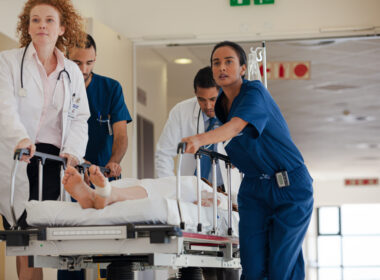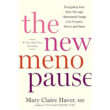Когда я мои первые месячныеВ двенадцать лет мне выдали две вещи: прокладку, похожую на подгузник, и беседу, состоящую из нескольких слов: "Не позволяй мальчикам трогать тебя там". Это был мой "прием" в женское общество. Больше не было никаких обсуждений, книг или визитов к врачу.
Сильное кровотечение и экстренная гистерэктомия: История моей мамы
Большую часть того, что я узнала о менструации, я узнала, наблюдая за своей мамой. В течение многих лет я наблюдала, как она терпела сильное кровотечение и болезненные спазмы. Кровотечение было настолько сильным, что она начала использовать полотенце, чтобы сдержать кровь. Врач прописал ей таблетки, больше ничего. Моя мать всегда отказывалась принимать их. Вместо этого она просила выписать ей рецепт на обезболивающее, чтобы облегчить спазмы. Она не проходила никаких дополнительных обследований и не получала никакой помощи.
Однажды она проснулась и поняла, что что-то ужасно не так. Она была бледна и дрожала. Кровотечение было не только сильным, но и не останавливалось. Я посмотрела на нее и сказала: "Мама, хватит! Ты должна сегодня же пойти к другому врачу!" Мама бросилась на поиски. Каким-то чудом ей удалось попасть к гинекологу, который был еще и хирургом. Когда он осмотрел ее, то опасался самого худшего: рака. Через несколько дней ей была сделана срочная операция. гистерэктомия в возрасте около сорока лет. Рака не было, но фиброиды завладел всей ее маткой. Я и не подозревала, что меня постигнет та же участь.
Таблетки, прописанные в связи с разрывом
В середине двадцатых я начала посещать маминого врача. Я была у нее всего два раза. Во второй раз я пришла на ежегодный осмотр, во время которого она меня не осматривала. Однако она выписала мне таблетки. Она объяснила это тем, что они помогут мне справиться с "депрессией". Да, я недавно пережила разрыв, но я никогда даже не упоминала о депрессии. Я была в замешательстве. Какую "депрессию" она имела в виду? Я взяла рецепт и вышла из ее кабинета. Я так и не заполнила его и не вернулась. На самом деле мне потребовалось целое десятилетие, чтобы вернуться к другому врачу.
Я взяла рецепт и вышла из ее кабинета. Я так и не заполнил его и не вернулся. На самом деле, мне потребовалось целое десятилетие, чтобы вернуться к другому врачу.
Вскоре мне было уже за тридцать, а у меня все еще не было даже мазок. Но я встретила замечательного парня, теперь уже моего мужа, и хотела быть уверена, что смогу забеременеть. Я нашла замечательного врача, который работал в том же здании, что и я. В отличие от моего предыдущего врача, она осмотрела меня и очень инициативно подошла к моему здоровью. Она назначила несколько тестов и анализов крови. Оказалось, что у меня были некоторые гинекологические проблемы. Меня направили к специалисту, и я получила необходимую помощь. Я чувствовала себя уверенно под присмотром своего нового врача. Я посещала ее ежегодно, и у меня сложилось впечатление, что все в порядке.
Мое знакомство с методами информирования о бесплодии
Когда мы с мужем обручились, я впервые узнала о методах информирования о бесплодии (FAM). (Хотите получить краткое представление о себе? Смотрите здесь.) Никто не рассказывал мне о них раньше - ни мама, ни подруги, ни даже врач. Мой тогдашний жених сказал мне, что мы должны записаться на курсы, чтобы составить график моих циклов. В тот момент я понятия не имела, что это значит!
Мы посетили ознакомительную сессию Метод овуляции Биллингсакоторый помогает женщине отслеживать фазы фертильности и бесплодия с помощью наблюдения за цервикальной слизью. Во время этого сеанса я неподвижно сидела на стуле и была тихой как мышь. Было ощущение, что мне открывают этот древний секрет, доступный лишь немногим женщинам.
На обратном пути я молчал. Не поймите меня неправильно! Я была искренне рада начать это новое путешествие. Впервые я знала, как функционирует мое собственное тело. Но как бы я ни была взволнована, в голове крутились мысли о смятении и гневе. Поразительно, что мне уже за тридцать, а я только сейчас узнала об этом. Почему мне никогда не рассказывали об этих методах?
На обратном пути я молчал. Не поймите меня неправильно! Я была искренне рада начать это новое путешествие. Впервые я знала, как функционирует мое собственное тело. Но как бы я ни была взволнована, в голове крутились мысли о смятении и гневе. Поразительно, что мне уже за тридцать, а я только сейчас узнала об этом. Почему мне никогда не рассказывали об этих методах?
Когда я рассказала об этом своему врачу, она призналась, что ничего не знает о планировании семьи. Она лишь поаплодировала мне за то, что я согласилась с моим партнером в вопросе планирования нашей семьи. Однако она предупредила меня, что такие "методы" не очень надежны и редко срабатывают. Тем не менее она уважала мое решение и никогда не настаивала на приеме таблеток, что я оценила.
Начертание пути к репродуктивному здоровью
Составление графика оказалось сложнее, чем я предполагала. Тем не менее, по мере продвижения вперед было интересно наблюдать, как меняется мой менструальный цикл изо дня в день. Я думала, что у меня идеальные циклы. Оказывается, они были беспорядочными.
Продолжая составлять карты, я не могла не думать о своей маме. Если бы она знала о FAM, возможно, ей не пришлось бы пройти такой сложный путь к бесплодию. Мне было больно думать, что эти методы могли бы помочь ей получить необходимую помощь, а не просто отмахнуться от нее или предложить таблетки.
Как и моей маме, мне пришлось столкнуться с трагедией, прежде чем меня стали воспринимать всерьез. В 2013 году у нас случился выкидыш. Это было самое болезненное, что я когда-либо испытывала. К тому времени мы переехали, я была новенькой в городе и металась в поисках врача. Когда выкидыш подтвердился, Мне сказали.: "Дорогая, все в порядке! Это значит, что ты можешь забеременеть!" Я стояла в этих халатах, которые никогда не закрываются как следует, и просто смотрела на доктора. Я знала, что заслуживаю большего.
Когда подтвердилось, что у меня выкидыш, мне сказали: "Дорогая, все в порядке! Это значит, что ты можешь забеременеть!" Я стояла в этих халатах, которые никогда не закрываются как следует, и просто смотрела на врача. Я знала, что заслуживаю большего.
Будучи тридцатипятилетней и пережив потерю беременности, я знала, что не найду решения, которое искала в рамках общепринятой медицины. Мне нужен был новый FAM, который помог бы мне выяснить, почему у нас случился выкидыш и почему мы не могли забеременеть. Именно тогда мы перешли на Модель Крейтона (Крейтон). В отличие от Биллингса, в Крейтоне есть протоколы восстановительной репродуктивной медицины (ВРМ)известный как NaProTechnology (NaPro). Используя информацию из ваших карт, врачи NaPro разрабатывают план действий, включающий серию своевременно проведенных анализов крови и других диагностических исследований, которые помогут оценить, диагностировать и вылечить многие проблемы, связанные с фертильностью.
Как бы ни было тяжело изучать два разных ФАМа, это также придало мне сил. Благодаря знаниям, полученным в ходе обширного изучения ФАМ, я смогла предсказать, когда начнутся мои следующие месячные, вместо того чтобы гадать об этом. Я также узнала, что мои гормоны были не в оптимальном состоянии, и начала принимать биоидентичный прогестерон. Под руководством врача NaPro я перешла на целенаправленный режим питания и приема добавок, который помог мне почувствовать себя здоровой как снаружи, так и изнутри. Впервые я почувствовала себя в какой-то степени ответственной за свою фертильность. Я не воспринимала составление графиков как бремя, это был образ жизни. Во многих отношениях FAM (а вместе с ней и RRM) стала путем к настоящему репродуктивному здоровью.
Обширный эндометриоз и бесплодие: Душераздирающие результаты отсутствия своевременной помощи
К сожалению, к этому времени годы неоптимального лечения нанесли свой урон моему организму. После того как мы сделали все возможное, включая хирургия эндометриозаТак закончилось мое путешествие по бесплодию. Во время операции выяснилось, что, сама того не подозревая, у меня IV стадия заболевания. эндометриозкоторая, вероятно, была у меня по крайней мере с начала двадцатых годов. Мне повезло, что удалось сохранить матку, но ущерб от болезни был слишком велик. Мне был 41 год, и я смирилась с тем, что больше никогда не смогу забеременеть.
Оглядываясь назад, я могу сказать только следующее: Я удручена отсутствием надлежащей медицинской помощи, которую получили и моя мама, и я. Возможно, конечный результат был бы тем же: ее гистерэктомия и мое бесплодие. И все же я всегда буду задаваться вопросом, был ли бы результат, который мы пережили, таким же, если бы мы были должным образом проинформированы и знали о FAM. Не то чтобы этих методов (и протоколов РРМ) не существовало. Но мейнстримная медицина о них не знает и не говорит. И это ужасный способ заботы о репродуктивном здоровье женщин.
Оглядываясь назад, я могу сказать только следующее: Я удручена отсутствием надлежащей медицинской помощи, которую получили и моя мама, и я. Возможно, конечный результат был бы тем же: ее гистерэктомия и мое бесплодие. Но я всегда буду задаваться вопросом, был ли бы результат, который мы пережили, таким же, если бы мы были должным образом проинформированы и знали о FAM и RRM.
Неслышимый и невидимый - вот что я чувствовал тогда. Все это можно было бы предотвратить, если бы меня просто приняли всерьез раньше. Почему таблетки были предложены мне без веских оснований? Почему меня даже не обследовали как следует? Почему я не задавала больше вопросов? Иногда эти вопросы до сих пор крутятся у меня в голове.
Помогаю другим женщинам получить образование и уход, в которых мне было отказано
Увы, теперь эти переживания остались в прошлом. В конце концов я понял, что все, что я могу сделать, - это двигаться вперед и учиться на своем опыте - и помогать другим делать то же самое. Собственно, именно этот опыт и подтолкнул меня к тому, чтобы пройти обучение как Крейтон-практик. В течение пяти лет я встречалась с сотнями молодых женщин и супружеских пар и помогала им вернуть фертильность в нормальное русло. Я была рядом со всеми: будь то женщина выход из запояженщина боится слезть с таблетокПара попытка избежать беременностипара, пытающаяся зачать ребенка, или пара столкновение с бесплодием или переживала выкидыши... Через все это я посвятила себя обучению женщин менструальным циклам, тому, как читать признаки своего тела, и тому, как защищать себя в вопросах репродуктивного здоровья, чтобы никто не прошел через то, через что прошли мы с мамой.
Мой опыт не уникален. Многим другим женщинам пришлось пройти через несколько врачей, прежде чем они нашли того, кто их выслушал. Многим назначали таблетки, а потом выяснялось, что с первопричиной их проблем можно было справиться с помощью правильное, безопасное, восстанавливающее репродуктивное здоровье-забота, которой женщины действительно заслуживают. Хотя я знаю, что я не последняя женщина, с которой такое случится, я буду продолжать делиться своим опытом в надежде, что он вдохновит других научиться читать признаки своего цикла и искать врачей, которые тоже умеют это делать.







